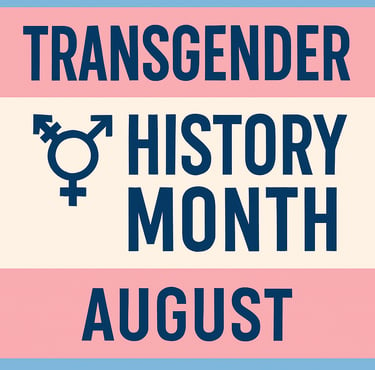Transgender History Month: Honoring Resilience and Legacy
Every August, Transgender History Month is observed as a time to reflect on the rich and often overlooked history of transgender and gender-nonconforming people.
8/9/20251 min read


Every August, Transgender History Month is observed as a time to reflect on the rich and often overlooked history of transgender and gender-nonconforming people. This month-long observance provides an opportunity to celebrate the resilience, achievements, and contributions of transgender individuals throughout history, while also recognizing the challenges they’ve faced. The choice of August is significant — it marks the anniversary of the 1966 Compton’s Cafeteria Riot in San Francisco, one of the first recorded acts of transgender resistance in the United States.
The Compton’s Cafeteria Riot, which occurred in August 1966, predated the more widely known Stonewall Uprising by three years. It was sparked when transgender women and drag queens, who were frequently harassed by police, fought back against a violent arrest. This uprising played a crucial role in igniting the transgender rights movement on the West Coast and remains a pivotal moment in LGBTQ+ history. August, therefore, serves as a powerful reminder of the long-standing activism and bravery of the transgender community.
Transgender History Month also highlights the stories of pioneers such as Marsha P. Johnson, Sylvia Rivera, Miss Major Griffin-Gracy, and Lou Sullivan — individuals who helped shape the modern LGBTQ+ rights movement. These figures challenged not only societal norms but also advocated within broader LGBTQ+ spaces to ensure transgender voices were heard and respected. Their legacies continue to inspire new generations of activists and allies working toward equity and inclusion.
Beyond its historical importance, Transgender History Month serves as a platform for education and awareness. It offers schools, libraries, museums, and communities a chance to uplift transgender narratives, examine policy changes, and foster dialogue about gender diversity. By understanding this history, society can better address the ongoing disparities faced by transgender people in areas such as healthcare, housing, employment, and legal recognition.
As more communities begin to officially recognize August as Transgender History Month, it reflects a growing commitment to inclusivity and historical accuracy. Celebrating this month not only honors those who came before but also supports the ongoing struggle for dignity, rights, and visibility for transgender individuals everywhere.
